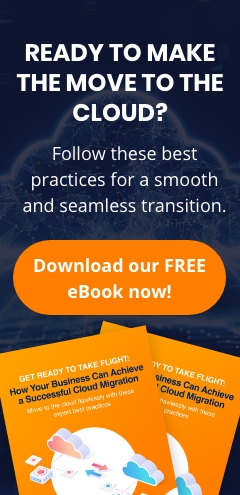When it comes to office networks, hybrid cloud solutions can be best of both worlds: all the advantages of the cloud without sacrificing the control you get with on-premises infrastructure. Instead of committing entirely to a public or private cloud, a hybrid cloud strategy utilizes both environments, allowing data and applications to move seamlessly between them.
This strategy offers you increased flexibility, efficiency, and cost savings, but is a hybrid cloud solution the right fit for your business? Let’s explore how a hybrid cloud model works, its benefits, and the scenarios when it makes the most sense so you can make an informed decision.
What is a hybrid cloud model?
A hybrid cloud environment integrates the on-premises infrastructure at your physical office with public and private cloud services.
- Public cloud: A public cloud environment is hosted on servers owned by a provider, to which you pay a subscription fee. Think Google Workspace or Microsoft 365. You rent space on their servers, which are shared by all of their customers. That shared access is what makes it a “public” cloud.
- Private cloud: You purchase and maintain cloud servers on-premises (or rent server stacks from a data center) that exclusively hosts your company’s cloud environment. Because this infrastructure isn’t shared with others, it’s considered a “private” cloud.
With a hybrid model, you rent server space and maintain your own, and have control over where data and apps are hosted.
For example, your business could store customer data on private servers to meet compliance requirements but use the public cloud for email, file storage, or collaboration tools. This freedom to choose the location of your data is the main appeal of hybrid models.
The benefits of a hybrid cloud model
Some businesses are better served by exclusively using public or private cloud environments. However, a hybrid cloud environment delivers advantages that neither fully on-premises nor fully cloud-based setups can offer:
- Flexibility and scalability: Scale resources up or down as needed without overinvesting in hardware. If your local storage fills up, you can offload to the public platform, which offers virtually limitless capacity.
- Cost efficiency: Since you don’t need to be constantly buying new servers, you pay for additional cloud resources only when required, reducing unnecessary expenses.
- Business continuity: Should either cloud platform experience downtime, you can keep operations running by balancing workloads across multiple environments.
- Cybersecurity and regulatory compliance: Data in public cloud environments is technically out of your total control, which some security regulations do not allow. With hybrid, you can store sensitive information in a private cloud and maintain complete oversight while using the public cloud for non-sensitive applications.
When is hybrid cloud the right choice for a business?
Like with most IT, hybrid cloud solutions aren’t for everyone. However, if your business is in one or more of these scenarios, a hybrid cloud model could be a valuable asset:
You’re in a regulated industry
If you operate under strict compliance rules (HIPAA, PCI DSS, GDPR, etc.), a hybrid cloud setup lets you keep sensitive data in a secure, controlled environment while leveraging cloud apps for efficiency.
You need highly scalable infrastructure
If your workloads fluctuate because of things such as seasonal spikes in demand, a hybrid approach allows you to scale up cloud resources temporarily without investing in new hardware, then easily scale down again to reduce monthly expenses.
You’re already operating with existing on-premises investments
If you already own a substantial on-premises infrastructure and won’t or can’t give it up, a hybrid cloud model helps you maximize that investment while adding cloud functionality.
You have significant disaster recovery and backup needs
If you’re in a high-risk environment or simply cannot afford any downtime, a hybrid cloud solution will give you peace of mind. It provides redundancy, allowing data backups in the cloud for fast recovery while maintaining mission-critical systems on premises.
Get peak IT performance for your business with a hybrid cloud network
One of the most compelling reasons for choosing hybrid cloud is performance optimization. You can run latency-sensitive applications on local servers for speed while using the cloud for storage and noncritical workloads. This combination keeps your business agile without sacrificing reliability, improving both your productivity and capacity for innovation.
But to make the most out of a hybrid cloud solution, you’ll need professional guidance and support. Contact outsourceIT for a free consultation. We will help you determine if hybrid is right for your business and if so, create a custom roadmap for a more secure and reliable network.

